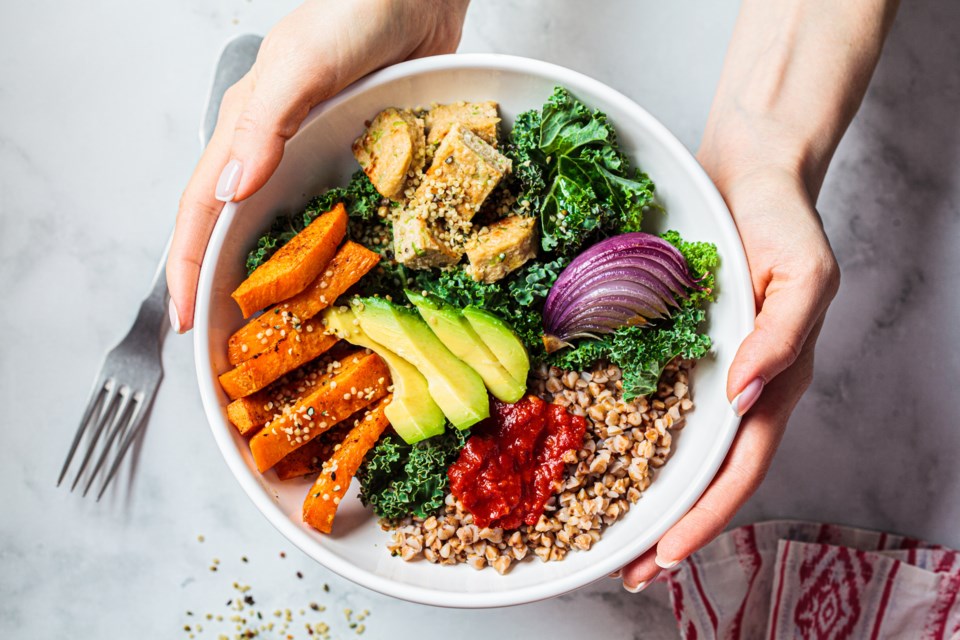People looking to adopt a vegetarian or vegan diet often find themselves contending with the long-held and widespread concern that plants simply don't provide an adequate amount of protein and essential nutrients.
While it is true that meat from animals can supply many nutrients required by the human body, it cannot provide all of them—and the same is true of plants. A healthy meal should be comprised of non-starchy fruits and vegetables (50%), whole grains of unprocessed starchy food (25%), and lean protein (25%), according to the Department of Agriculture. The latter food group is the point of contention.
Plants certainly contain quality protein but in different amounts than an equal portion of meat. Generally, legumes are higher in protein than other plants and much richer in fibre than any animal product. Certain fruits are packed with crucial vitamins—such as vitamin C—and are better sources of healthy fats needed by the body to function properly. Nonetheless, meat also provides essential nutrients that are not found in most plants, but that can and should be supplemented.
Another issue that has taken centre stage in recent years is the way meat production affects climate change. Environmental protection activists and agencies have been trying to raise awareness by spreading data-supported information about how toxic the industry is to the planet. A 2021 report published in Nature Food, for example, found that global greenhouse gas emissions produced by the meat industry are twice that of those caused by the production of plant-based foods.
Nevertheless, many factors should be taken into consideration before adopting any kind of diet. Habits, preferences, and availability of foods are often the key deciders, but health and well-being are equally as important in making dietary decisions. Ideally, everybody should consult a doctor before transitioning into a new food regime.
Thistle investigated how much of various plant-based foods you would have to eat to get the same amount of protein as from meat using data from My Food Data.
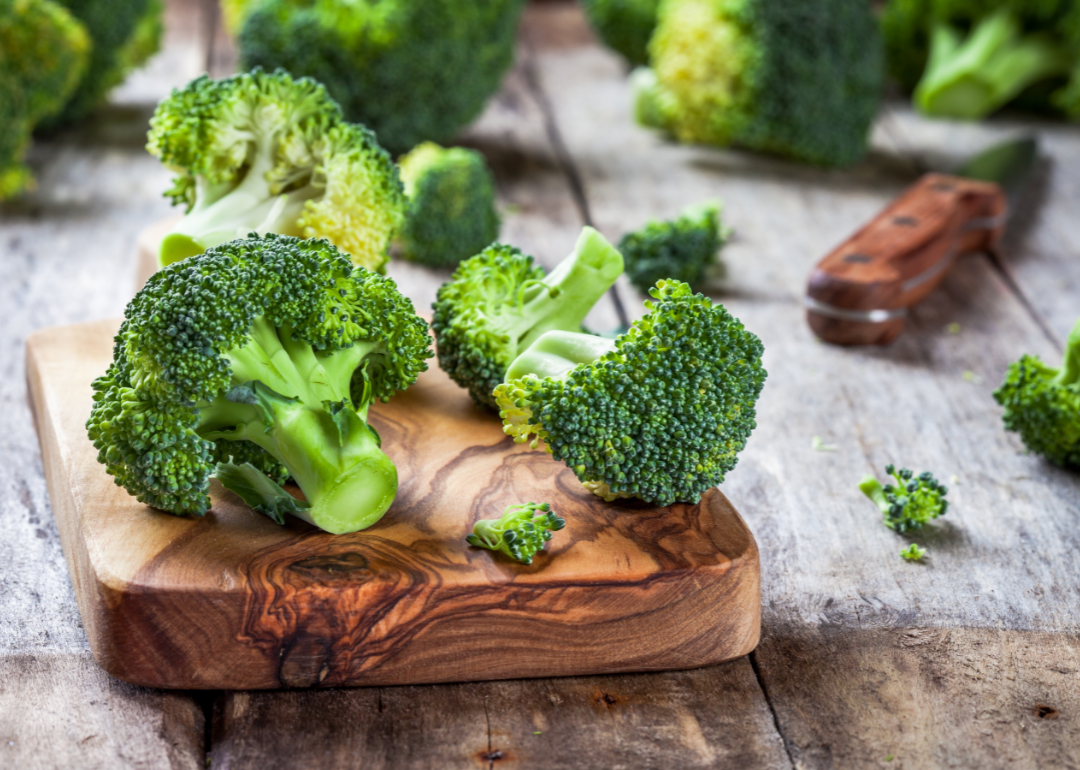
Canva
Broccoli
- Protein per 100g: 2.4g
--- Protein per 200 cal: 13.6g
- Amount for equivalent protein to 100g/200 cal chicken breast: 1,337.5g/600.0 cal
- Amount for equivalent protein to 100g/200 cal pork chop: 1,291.7g/467.6 cal
- Amount for equivalent protein to 100g/200 cal beef skirt steak: 1,195.8g/314.7 cal
Not everyone is a fan of the flavourful green florets, but we should all be. Aside from providing proteins, broccoli is low in calories and high in antioxidants and fiber. It is also a premium provider of iron, potassium, and vitamins C and K. If you prefer a vegetarian diet, an au gratin recipe with any kind of cheese may suit even the pickiest diners.
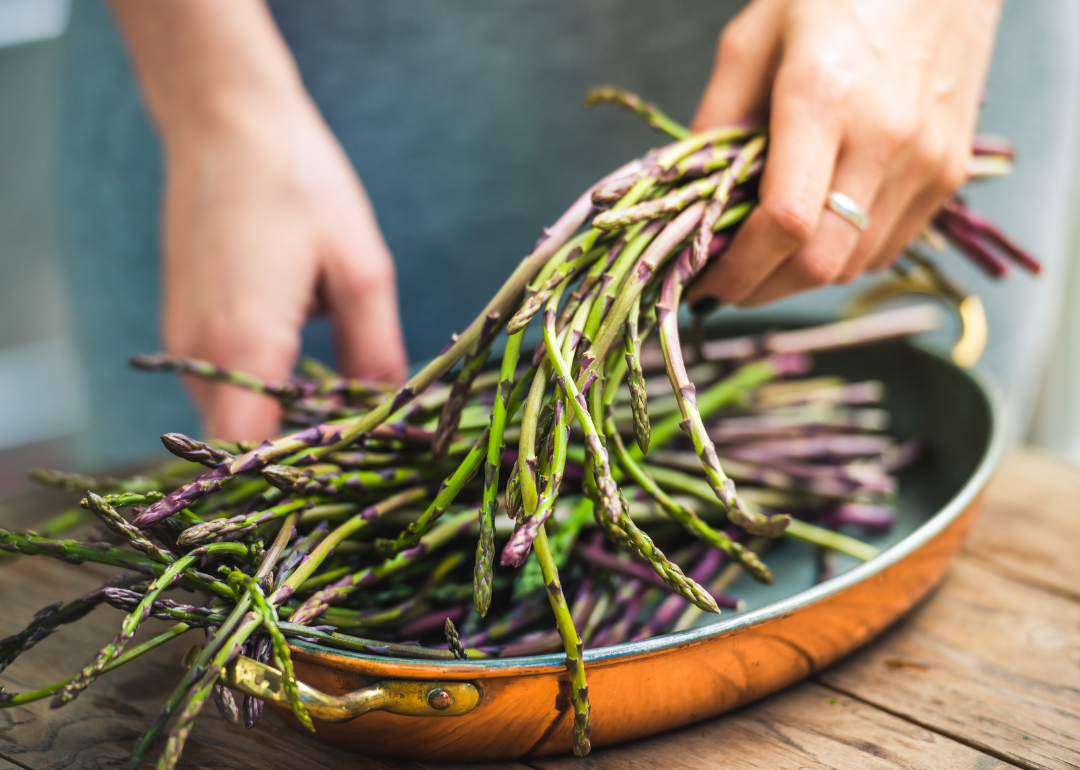
Canva
Asparagus
- Protein per 100g: 2.4g
--- Protein per 200 cal: 21.8g
- Amount for equivalent protein to 100g/200 cal chicken breast: 1,337.5g/374.3 cal
- Amount for equivalent protein to 100g/200 cal pork chop: 1,291.7g/291.7 cal
- Amount for equivalent protein to 100g/200 cal beef skirt steak: 1,195.8g/196.3 cal
There are over 300 species of asparagus. The most common variety is Asparagus officinalis, an edible low-calorie plant with an impressive list of nutrients. Asparagus is an outstanding source of vitamin K, needed to maintain bone health and prevent blood clotting. It is also packed with vitamin C, calcium, phosphorous, potassium, and folate.
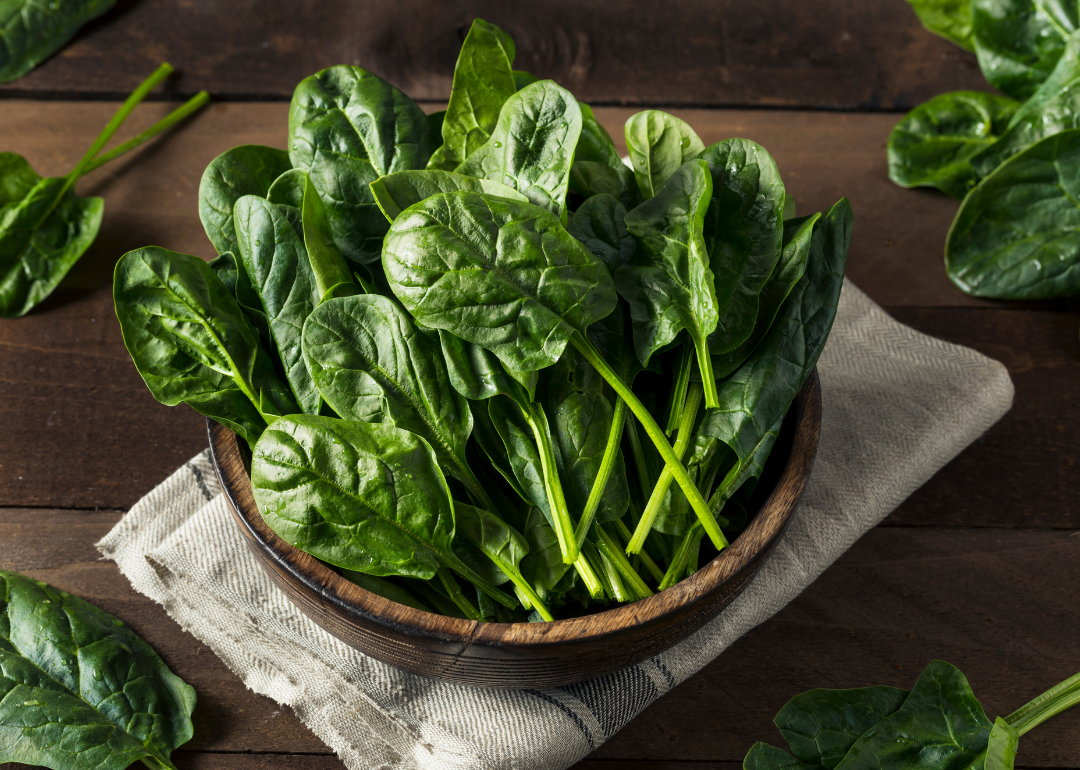
Canva
Spinach
- Protein per 100g: 3.0g
--- Protein per 200 cal: 25.8g
- Amount for equivalent protein to 100g/200 cal chicken breast: 1,070.0g/316.3 cal
- Amount for equivalent protein to 100g/200 cal pork chop: 1,033.3g/246.5 cal
- Amount for equivalent protein to 100g/200 cal beef skirt steak: 956.7g/165.9 cal
The green leaf has enjoyed free positive marketing since the 1930s when the comic strip character Popeye started promoting canned spinach as an instant muscle-building food. You may not see the benefits of eating spinach automatically but be assured that it is a nutrient-rich vegetable. Potassium, calcium, beta carotene, and vitamins A and K are abundant in the beloved sailor's favourite food, as is iron, which is important for healthy red blood cells.
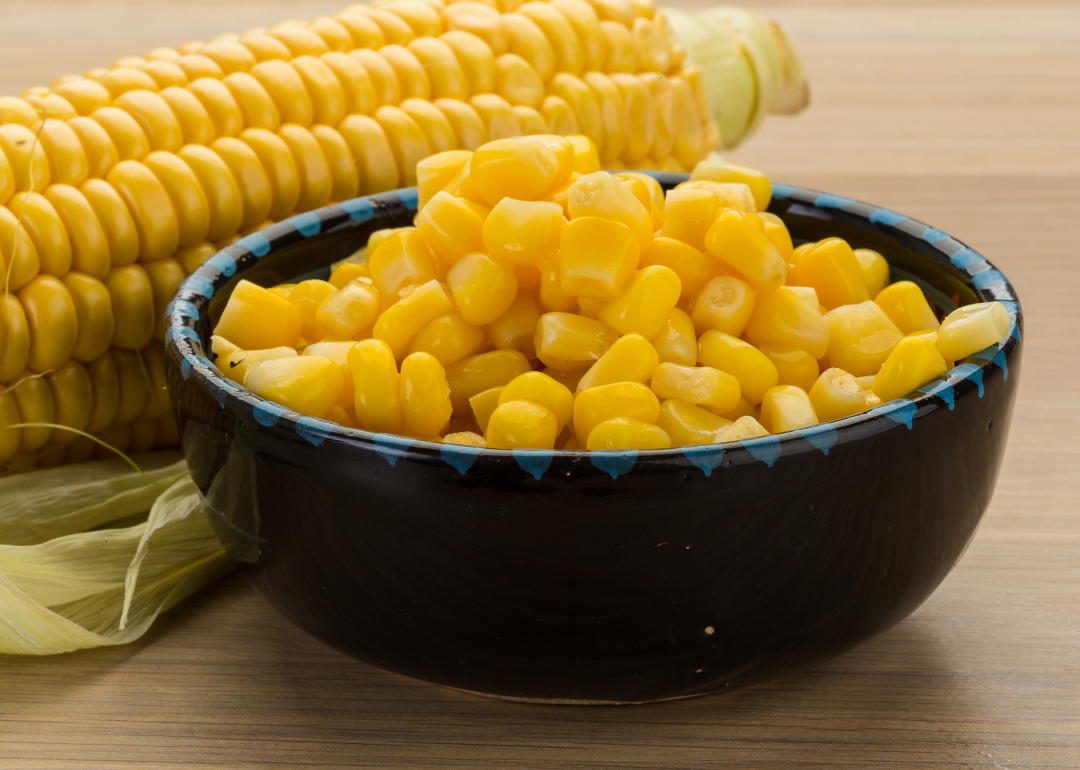
Canva
Sweet corn
- Protein per 100g: 3.3g
--- Protein per 200 cal: 7.6g
- Amount for equivalent protein to 100g/200 cal chicken breast: 972.7g/1,073.7 cal
- Amount for equivalent protein to 100g/200 cal pork chop: 939.4g/836.8 cal
- Amount for equivalent protein to 100g/200 cal beef skirt steak: 869.7g/563.2 cal
Sweet corn is easy on the eyes and the palate. It is also filled with vitamins and minerals. When corn is harvested mature and dry, it is considered a grain, but when it is consumed young and tender, it's a vegetable. Sweet corn not only makes salads tastier, but it can also bring an interesting twist to traditional dishes. Ever tried Southern corn pancakes? Yum.
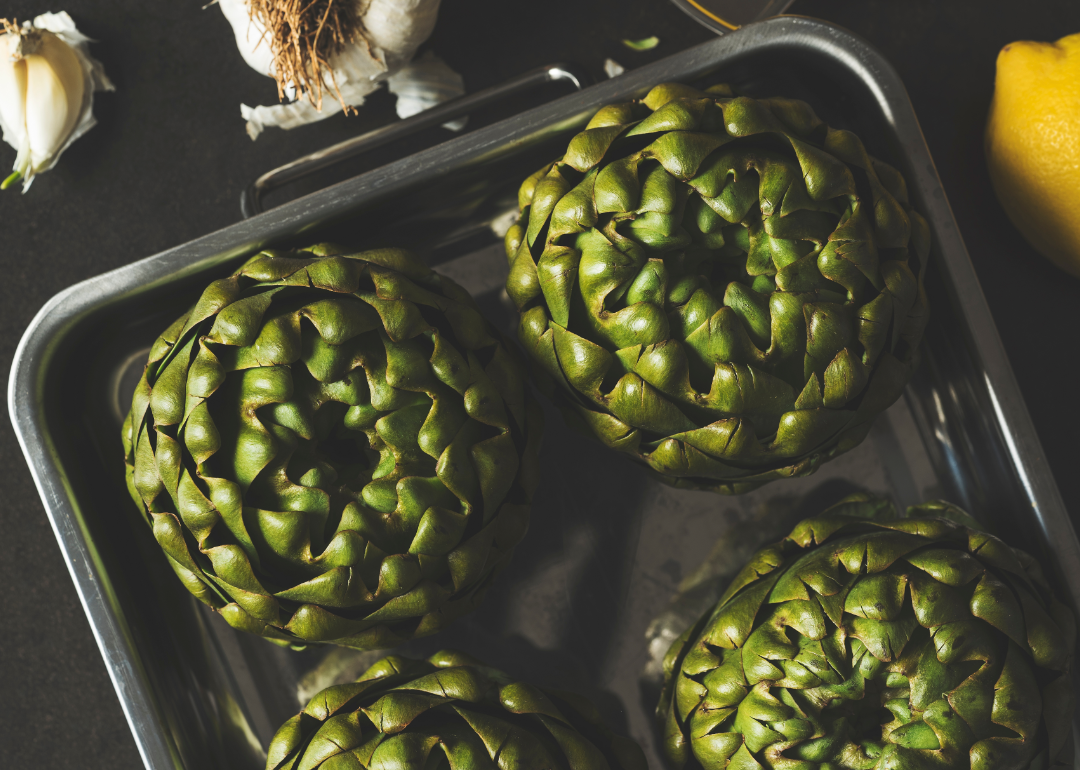
Canva
Artichokes
- Protein per 100g: 3.3g
--- Protein per 200 cal: 13.9g
- Amount for equivalent protein to 100g/200 cal chicken breast: 972.7g/587.1 cal
- Amount for equivalent protein to 100g/200 cal pork chop: 939.4g/457.6 cal
- Amount for equivalent protein to 100g/200 cal beef skirt steak: 869.7g/307.9 cal
The world-famous Mediterranean diet includes artichokes in many of its recipes. They can be served marinated, stuffed, truffled, or grilled. The cook's imagination is the limit for this sophisticated ingredient. Regardless of how they are prepared, artichokes are a low-glycemic index food, rich in vitamin C and calcium.
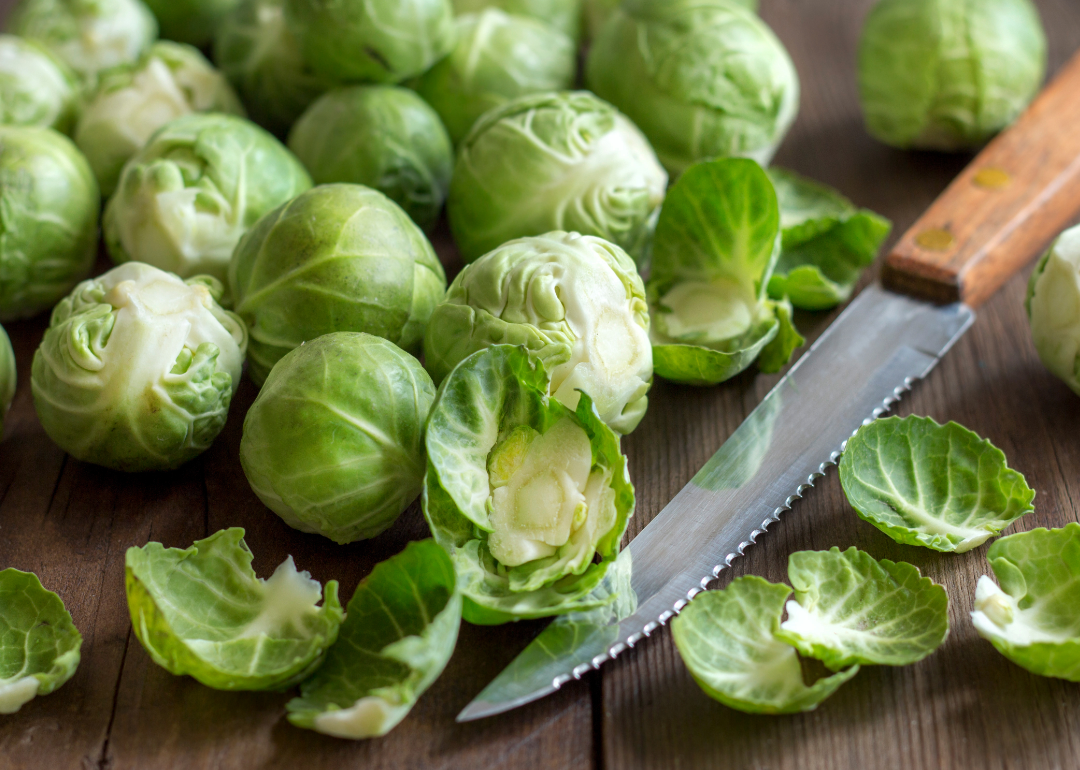
Canva
Brussels sprouts
- Protein per 100g: 3.6g
--- Protein per 200 cal: 14.2g
- Amount for equivalent protein to 100g/200 cal chicken breast: 891.7g/574.6 cal
- Amount for equivalent protein to 100g/200 cal pork chop: 861.1g/447.9 cal
- Amount for equivalent protein to 100g/200 cal beef skirt steak: 797.2g/301.4 cal
The vegetables that look like mini cabbages are gigantic in nutrients. Brussels sprouts are an excellent source of folate and vitamins K and C. They are high in fibre and low in calories, a perfect combination to maintain a healthy digestive system. If you can't get kids to eat them boiled, try chopping and sautéing them until golden in olive oil with sea salt and minced garlic cloves or roasting them in the oven with the same ingredients.
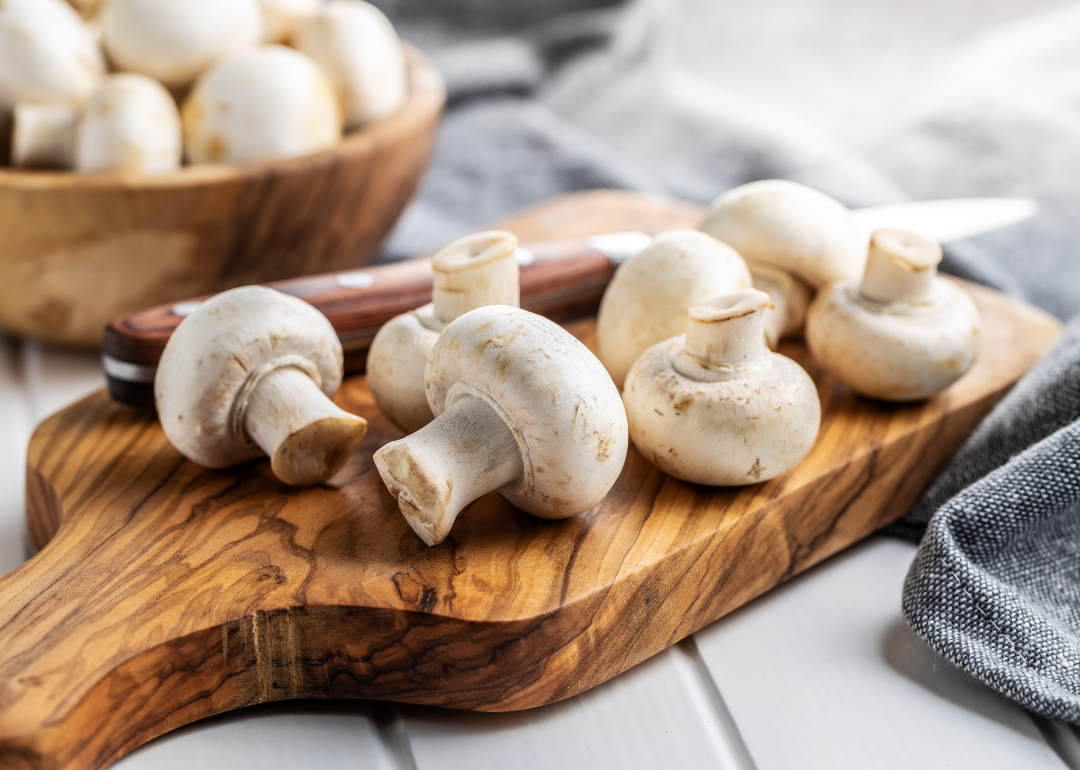
Canva
White button mushrooms
- Protein per 100g: 3.6g
--- Protein per 200 cal: 27.5g
- Amount for equivalent protein to 100g/200 cal chicken breast: 891.7g/296.7 cal
- Amount for equivalent protein to 100g/200 cal pork chop: 861.1g/231.3 cal
- Amount for equivalent protein to 100g/200 cal beef skirt steak: 797.2g/155.6 cal
European gastronomy favours dishes with creamy sauces made with cooked fungi, while Asians traditionally prefer them raw or lightly cooked. Either way, vitamins B5, B2 (riboflavin), B3 (niacin), and copper are abundant in white button mushrooms.
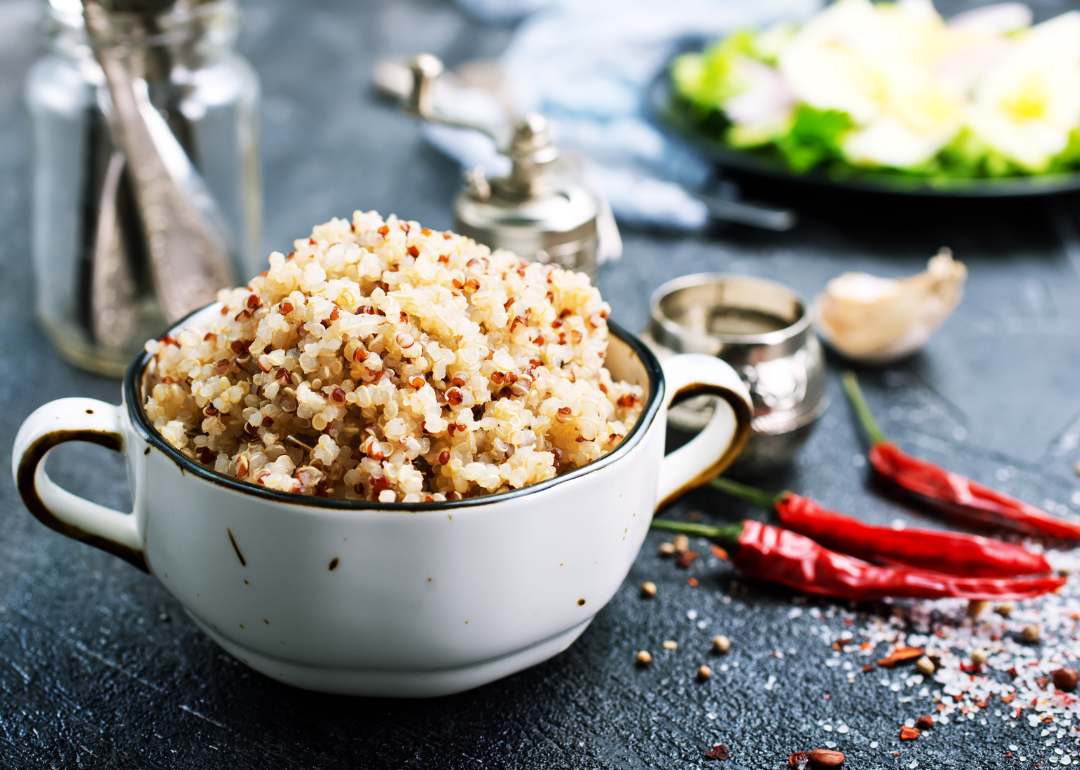
Canva
Quinoa
- Protein per 100g: 4.4g
--- Protein per 200 cal: 7.3g
- Amount for equivalent protein to 100g/200 cal chicken breast: 729.5g/1,117.8 cal
- Amount for equivalent protein to 100g/200 cal pork chop: 704.5g/871.2 cal
- Amount for equivalent protein to 100g/200 cal beef skirt steak: 652.3g/586.3 cal
Presented in recent years as a super-food, quinoa has more nutrients than other grains. Since it does not grow on grass—like wheat, rice, or oats—it is considered a pseudo-cereal. The Andean whole grain—known by Indigenous tribes centuries before colonial times—is rich in potassium, manganese, phosphorus, iron, selenium, and magnesium. It is a low-glycemic index food packed with fibre.
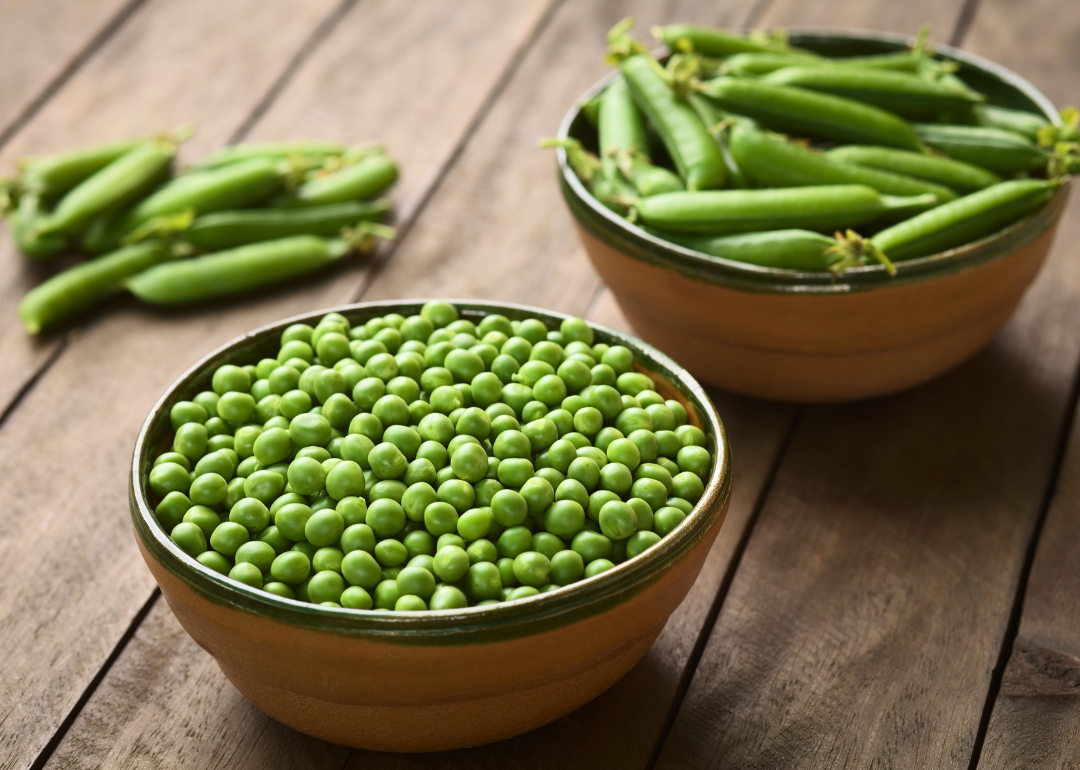
Canva
Green peas
- Protein per 100g: 5.4g
--- Protein per 200 cal: 12.8g
- Amount for equivalent protein to 100g/200 cal chicken breast: 594.4g/637.5 cal
- Amount for equivalent protein to 100g/200 cal pork chop: 574.1g/496.9 cal
- Amount for equivalent protein to 100g/200 cal beef skirt steak: 531.5g/334.4 cal
Green peas are nutritious, healthy, and easy on the stomach; that's why they are one of the first foods fed to infants. Picking up the tiny legumes helps develop fine motor skills, while they supply vitamins K, C, and B, manganese, copper, and iron.
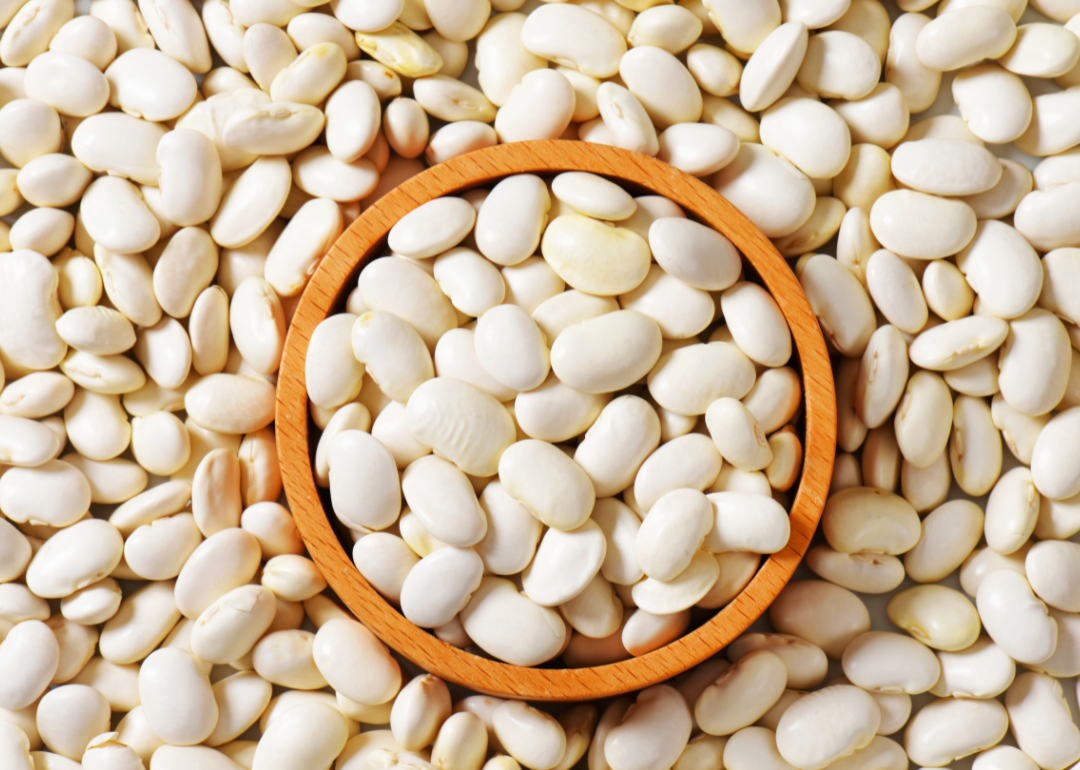
Canva
Lima beans
- Protein per 100g: 6.8g
--- Protein per 200 cal: 11.1g
- Amount for equivalent protein to 100g/200 cal chicken breast: 472.1g/735.1 cal
- Amount for equivalent protein to 100g/200 cal pork chop: 455.9g/573.0 cal
- Amount for equivalent protein to 100g/200 cal beef skirt steak: 422.1g/385.6 cal
Different types of lima beans have been part of the diet of Mesoamerican people since pre-Hispanic times. Fast-forward to present-day southern Europe and you will find them in several recipes. Though packed with vitamins and minerals, what is really impressive is the amount of iron they contain, even more than leafy greens.
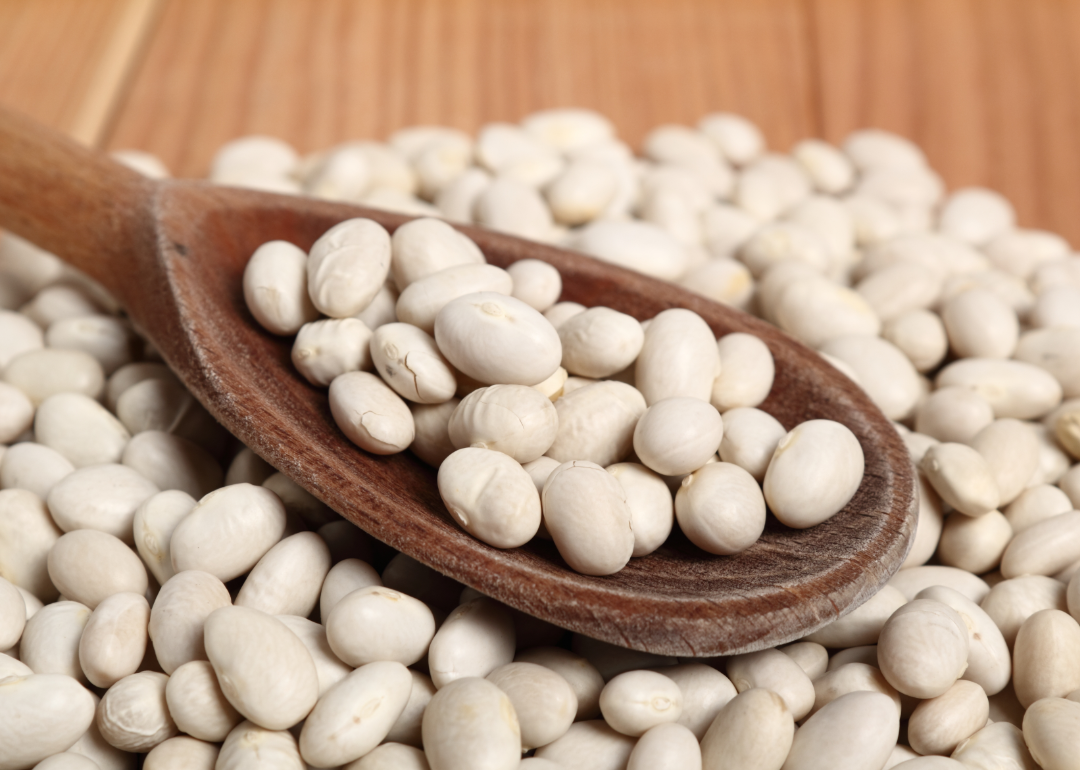
Canva
Navy beans
- Protein per 100g: 8.2g
--- Protein per 200 cal: 11.8g
- Amount for equivalent protein to 100g/200 cal chicken breast: 391.5g/691.5 cal
- Amount for equivalent protein to 100g/200 cal pork chop: 378.0g/539.0 cal
- Amount for equivalent protein to 100g/200 cal beef skirt steak: 350.0g/362.7 cal
Like all their "cousins," navy beans are stuffed with fiber, minerals, and vitamins. In Spain, the cooked legumes are combined with olive oil, chopped scallions, bay leaves, sun-dried tomatoes, garlic, and salt to make an easy and tasty dish served cold in summer or warm in winter.
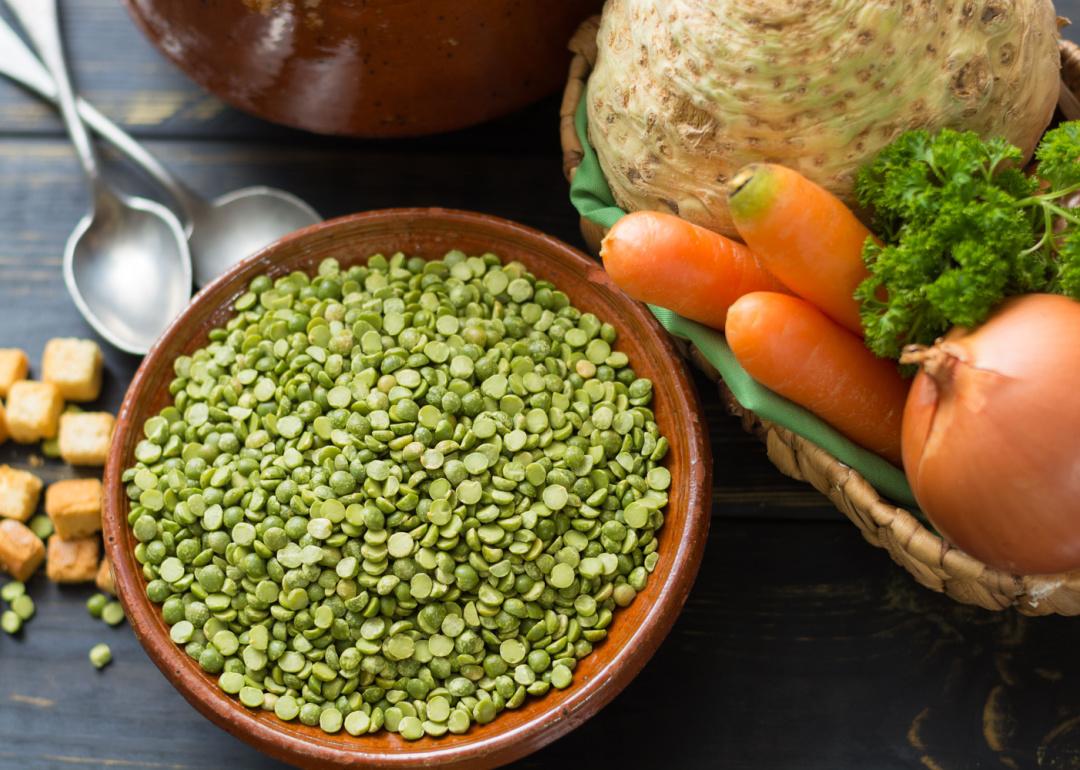
barmalini // Shutterstock
Split peas
- Protein per 100g: 8.3g
--- Protein per 200 cal: 14.1g
- Amount for equivalent protein to 100g/200 cal chicken breast: 386.7g/578.7 cal
- Amount for equivalent protein to 100g/200 cal pork chop: 373.5g/451.1 cal
- Amount for equivalent protein to 100g/200 cal beef skirt steak: 345.8g/303.5 cal
Several Mediterranean, African, and Middle Eastern countries have included split peas in their traditional dishes for centuries. As a puree similar to hummus, in stews or soups, different types of split peas are prepared with all kinds of condiments, meats, and spices to make nutrient-filled tasty recipes that eventually found their way West.
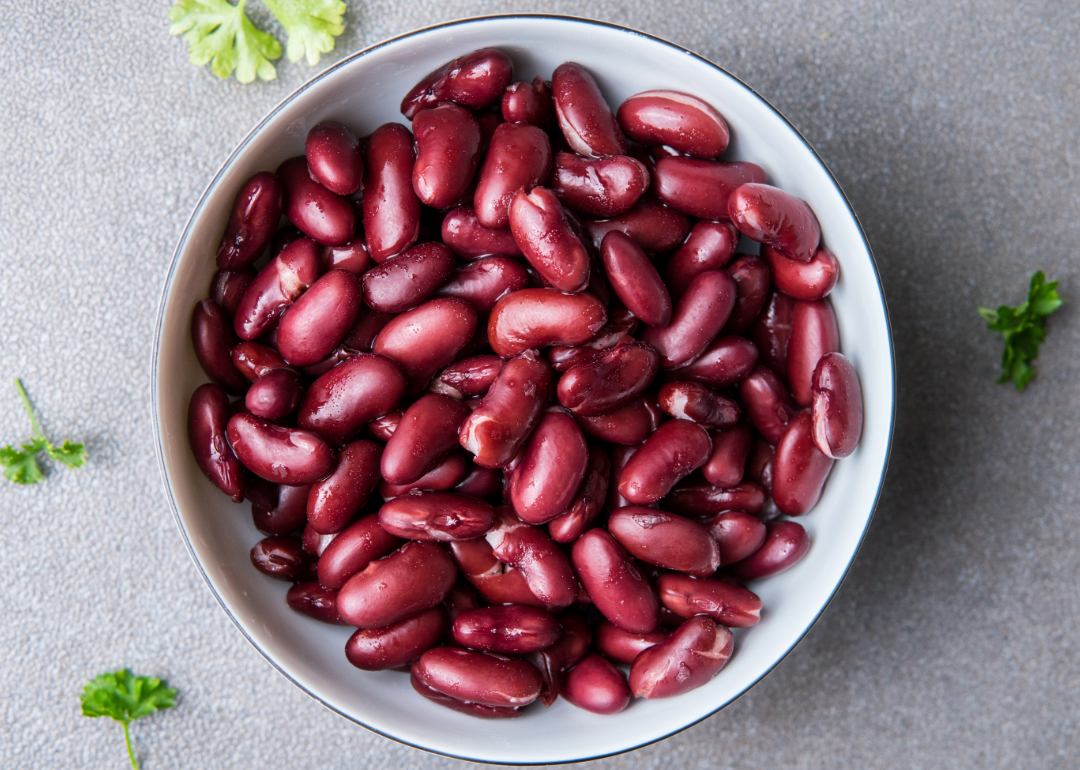
Canva
Kidney beans
- Protein per 100g: 8.7g
--- Protein per 200 cal: 13.7g
- Amount for equivalent protein to 100g/200 cal chicken breast: 369.0g/595.6 cal
- Amount for equivalent protein to 100g/200 cal pork chop: 356.3g/464.2 cal
- Amount for equivalent protein to 100g/200 cal beef skirt steak: 329.9g/312.4 cal
In a vegetarian or vegan diet, the main concern of nutritionists is the proper intake of iron, B-complex vitamins, and folates, which are amply found in meat, eggs, and dairy. However, kidney beans are a trustworthy source of such nutrients, as are other legumes. Honey barbecue slow-cooked kidney beans are popular in Southern gastronomy.
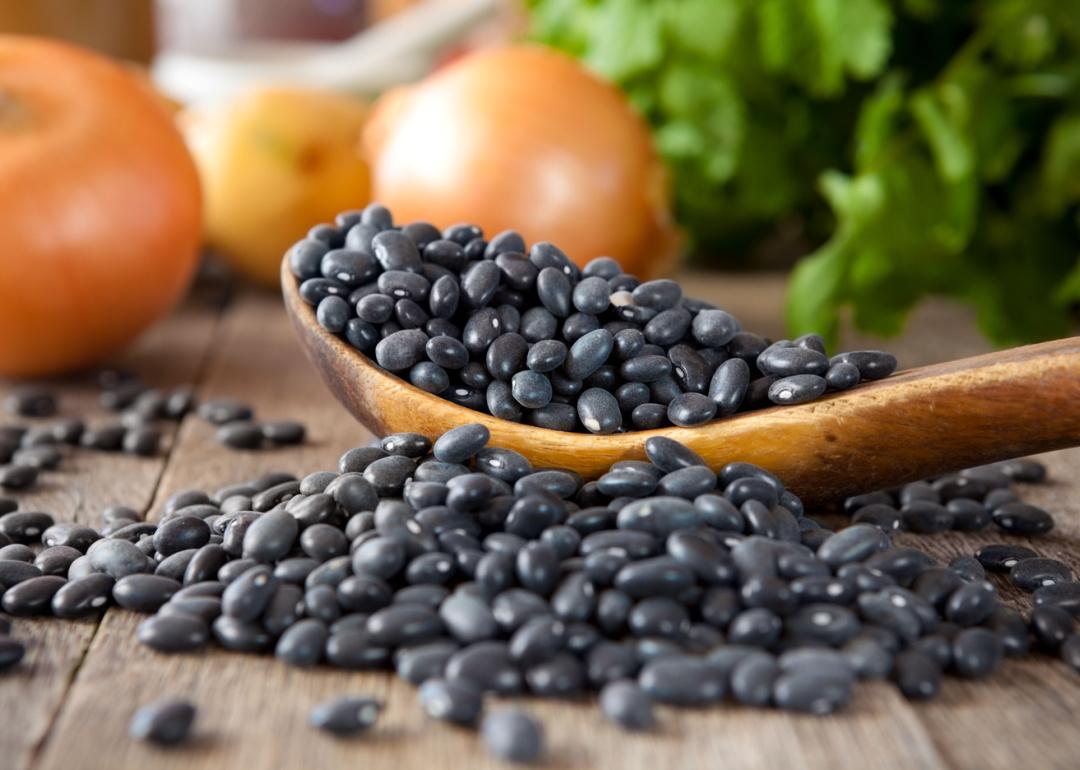
M.M.PHOTO // Shutterstock
Black beans
- Protein per 100g: 8.9g
--- Protein per 200 cal: 13.4g
- Amount for equivalent protein to 100g/200 cal chicken breast: 360.7g/609.0 cal
- Amount for equivalent protein to 100g/200 cal pork chop: 348.3g/474.6 cal
- Amount for equivalent protein to 100g/200 cal beef skirt steak: 322.5g/319.4 cal
Black beans are the supreme ingredient of Caribbean home meals. From Cuba's "arroz congri" to Venezuela's "pabellón" to Brazilian "feijoada," black beans have become a culinary and cultural staple that has conquered devotees beyond Latin America's borders, becoming a worldwide source of protein.
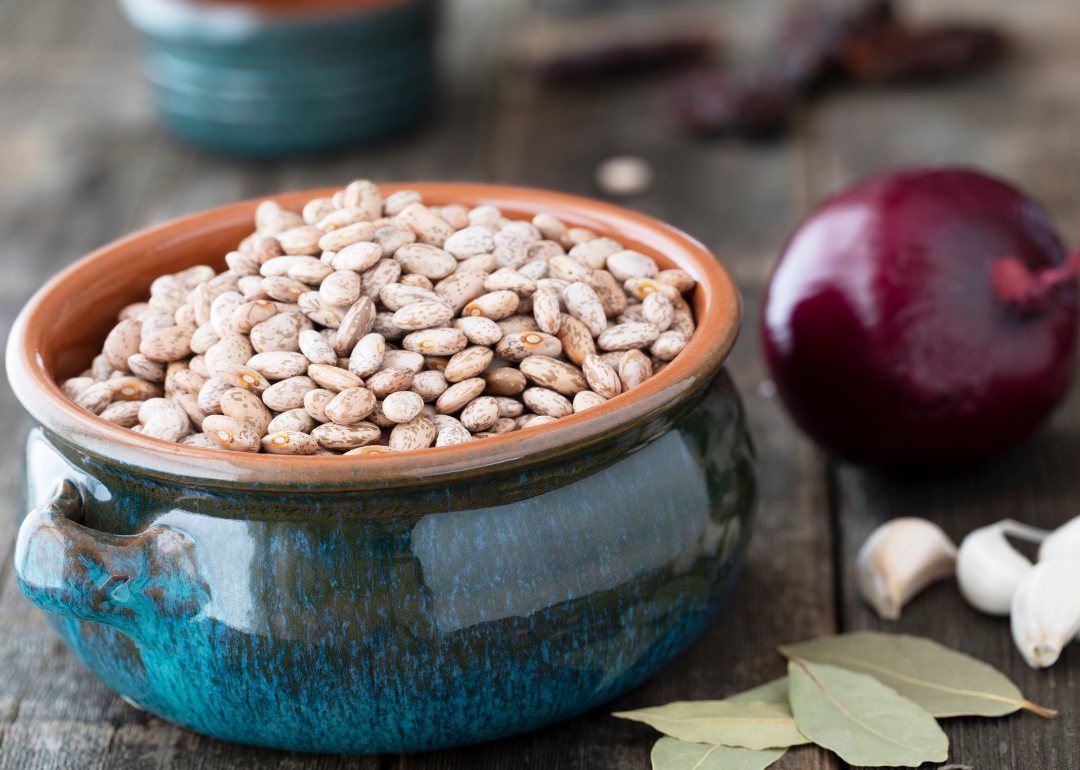
Canva
Pinto beans
- Protein per 100g: 9.0g
--- Protein per 200 cal: 12.6g
- Amount for equivalent protein to 100g/200 cal chicken breast: 356.7g/647.6 cal
- Amount for equivalent protein to 100g/200 cal pork chop: 344.4g/504.8 cal
- Amount for equivalent protein to 100g/200 cal beef skirt steak: 318.9g/339.7 cal
Mexican, Tex-Mex, and Cal-Mex cuisine cannot exist without pinto beans. As a main ingredient of burritos and chili con carne or as a perfect side for Baja fish tacos, pinto beans are both delicious and nutritious. They are particularly rich in iron and phosphorus.
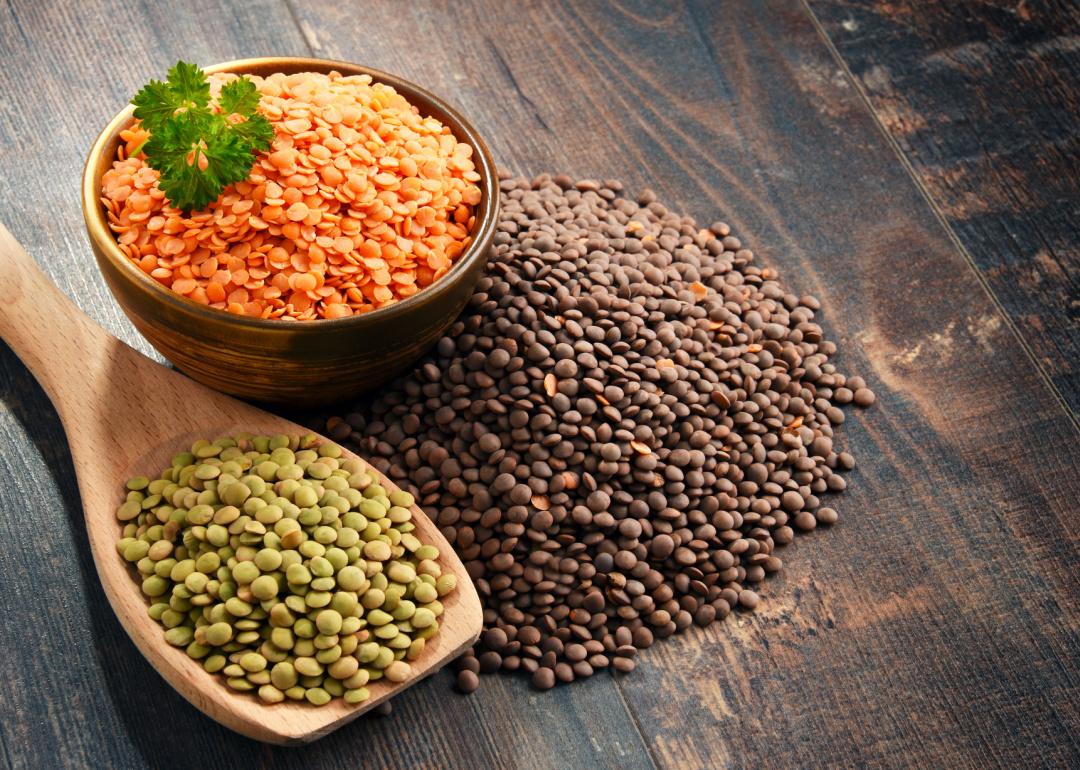
monticello // Shutterstock
Lentils
- Protein per 100g: 9.0g
--- Protein per 200 cal: 15.6g
- Amount for equivalent protein to 100g/200 cal chicken breast: 356.7g/523.1 cal
- Amount for equivalent protein to 100g/200 cal pork chop: 344.4g/407.7 cal
- Amount for equivalent protein to 100g/200 cal beef skirt steak: 318.9g/274.4 cal
This flavourful legume is known to be a prime source of fibre. However, they also contain considerable amounts of iron and folate. Many cultures have created savoury dishes prepared with brown, green, or red lentils. One you can't miss is Turkish lentil soup, made with red lentils, extra virgin olive oil, garlic, and Aleppo pepper flakes.
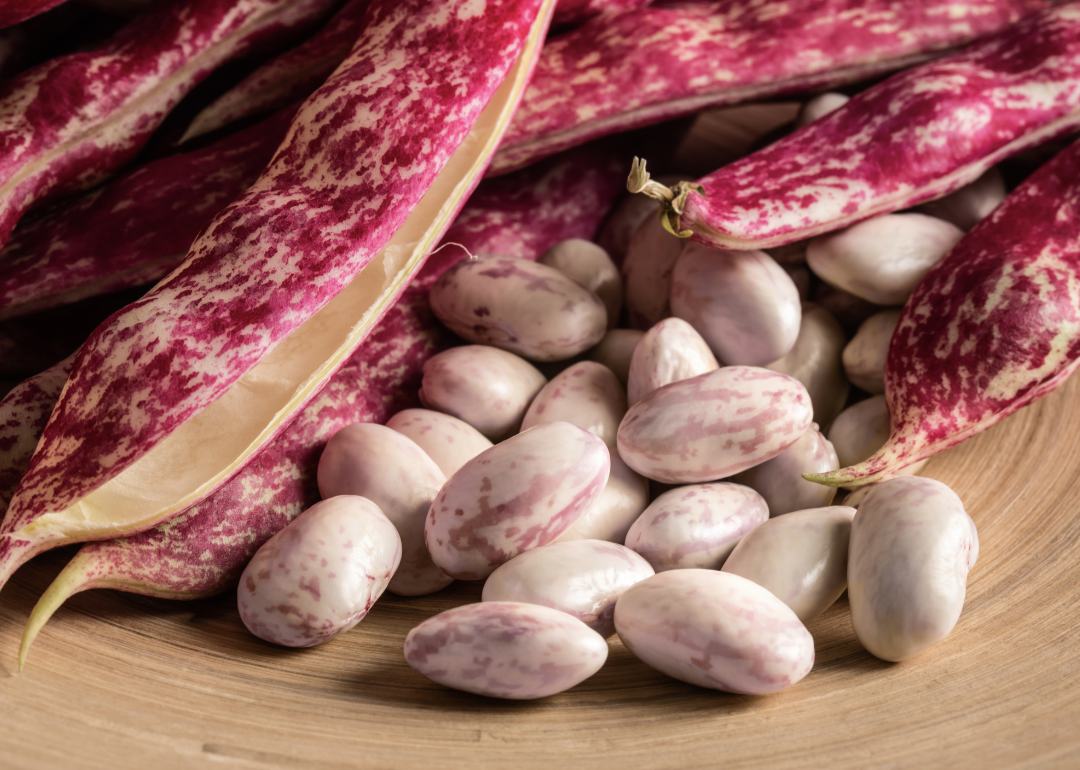
Canva
Borlotti beans
- Protein per 100g: 9.3g
--- Protein per 200 cal: 13.7g
- Amount for equivalent protein to 100g/200 cal chicken breast: 345.2g/595.6 cal
- Amount for equivalent protein to 100g/200 cal pork chop: 333.3g/464.2 cal
- Amount for equivalent protein to 100g/200 cal beef skirt steak: 308.6g/312.4 cal
Endemic to northern parts of South America, borlotti beans were made popular thanks to Italian and Portuguese casseroles, soups, and sides. Their attractive pinkish colour with red specks and creamy texture makes them perfect for both hot and cold recipes.
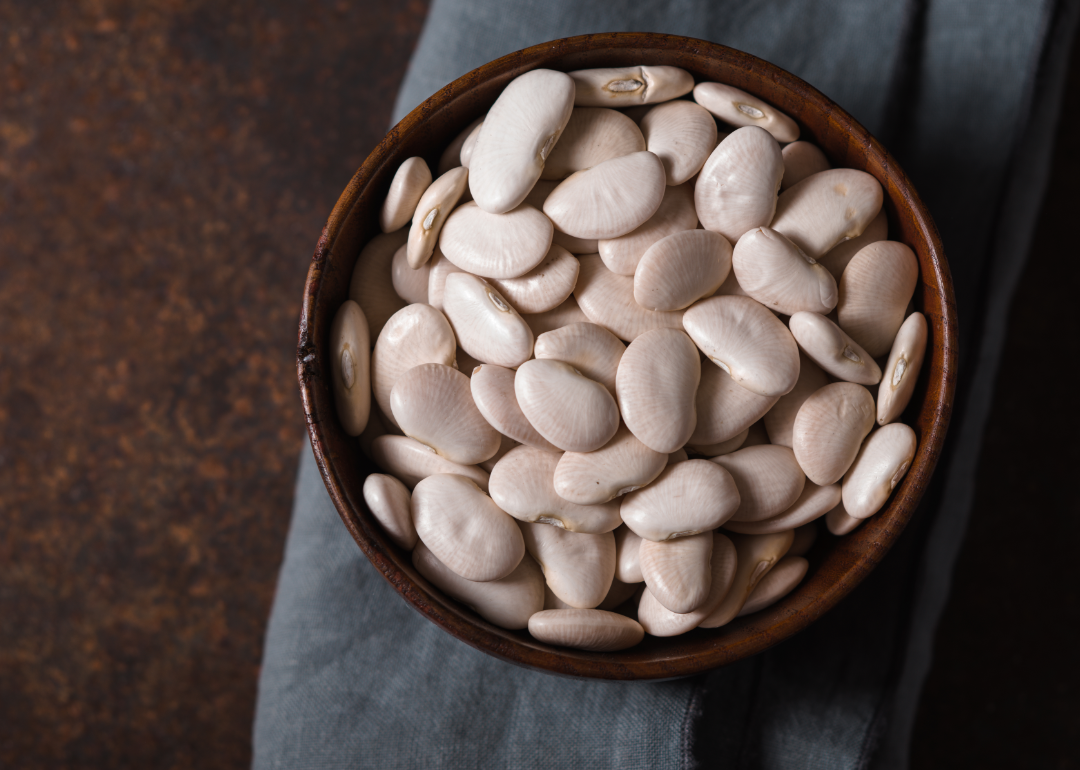
Canva
Large white beans
- Protein per 100g: 9.7g
--- Protein per 200 cal: 14.0g
- Amount for equivalent protein to 100g/200 cal chicken breast: 330.9g/582.9 cal
- Amount for equivalent protein to 100g/200 cal pork chop: 319.6g/454.3 cal
- Amount for equivalent protein to 100g/200 cal beef skirt steak: 295.9g/305.7 cal
If you are searching for a nutrient-rich bean, look no further. Large white beans contain larger amounts of iron, magnesium, phosphorus, potassium, copper, and manganese than their legume counterparts. They are also packed with folates and vitamin E and are the highest source of protein among beans.
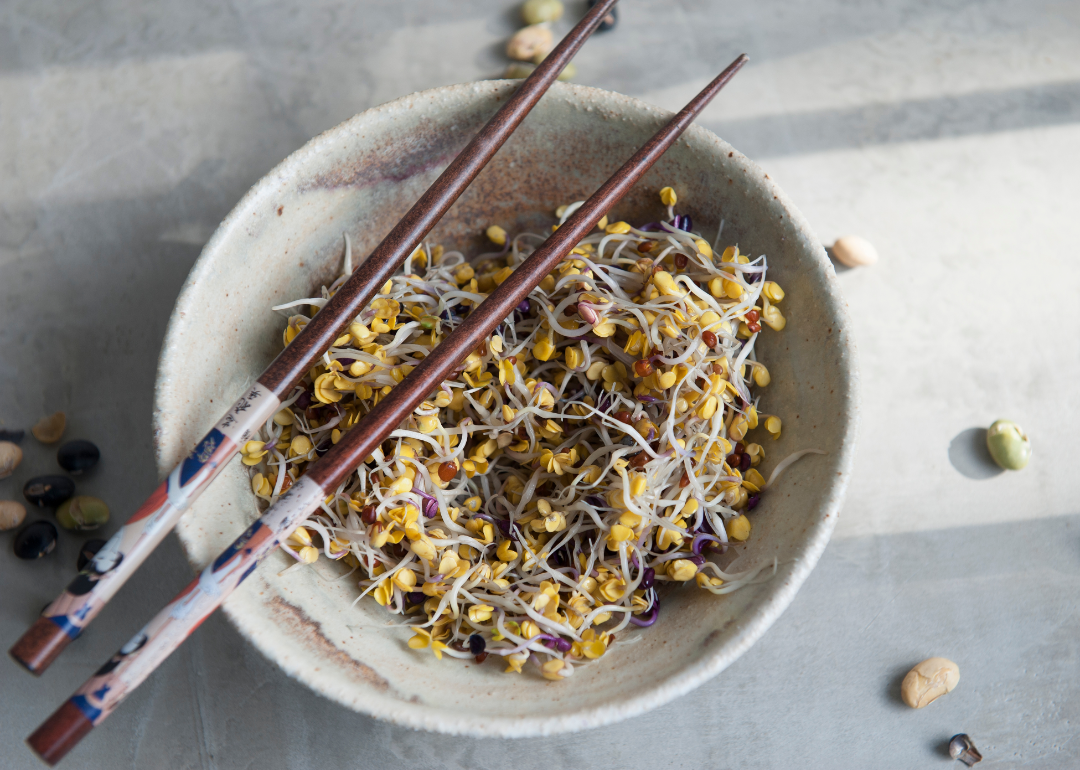
Canva
Soybean sprouts
- Protein per 100g: 13.1g
--- Protein per 200 cal: 21.5g
- Amount for equivalent protein to 100g/200 cal chicken breast: 245.0g/379.5 cal
- Amount for equivalent protein to 100g/200 cal pork chop: 236.6g/295.8 cal
- Amount for equivalent protein to 100g/200 cal beef skirt steak: 219.1g/199.1 cal
Though common in traditional Asian dishes, in recent decades soybean sprouts have found their way into Western recipes, even in sandwiches. While mild in flavour, they are rich in nutrients such as magnesium, copper, manganese, vitamin C, B-complex vitamins, and folates.
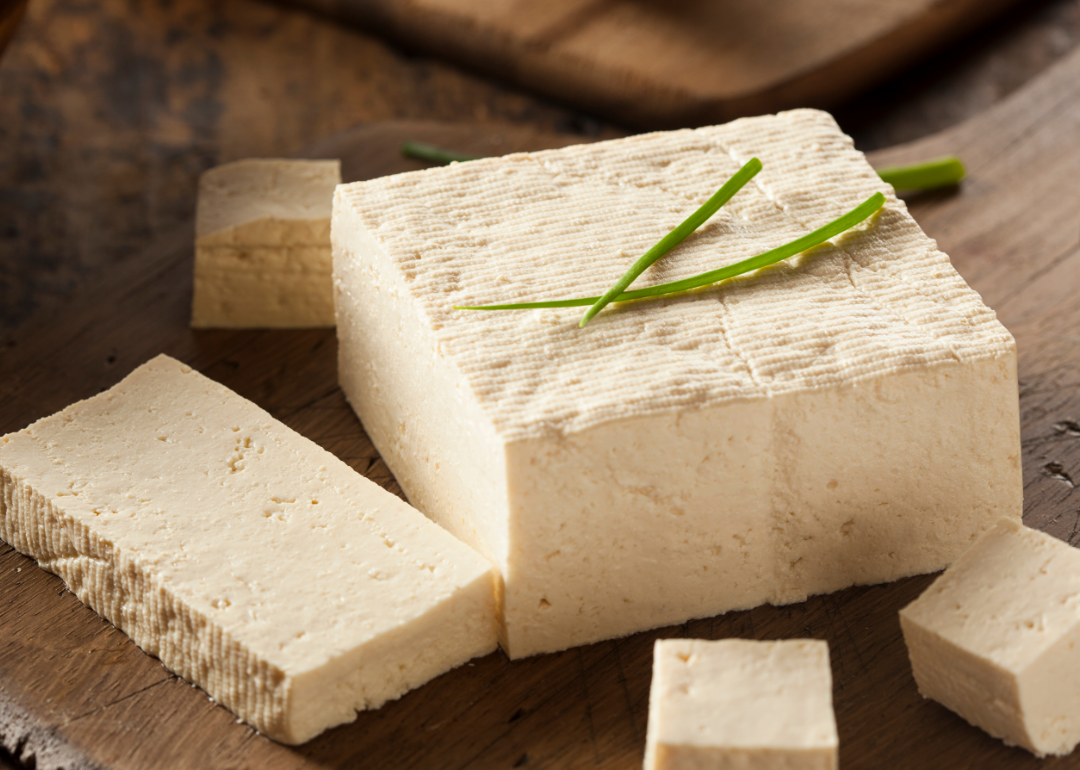
Canva
Firm tofu
- Protein per 100g: 17.3g
--- Protein per 200 cal: 24.0g
- Amount for equivalent protein to 100g/200 cal chicken breast: 185.5g/340.0 cal
- Amount for equivalent protein to 100g/200 cal pork chop: 179.2g/265.0 cal
- Amount for equivalent protein to 100g/200 cal beef skirt steak: 165.9g/178.3 cal
Firm tofu can transform a vegan chef's kitchen into an experiment lab. It can be used to replace beef, chicken, or cheese in hundreds of recipes while adding impressive amounts of calcium, manganese, copper, and selenium.
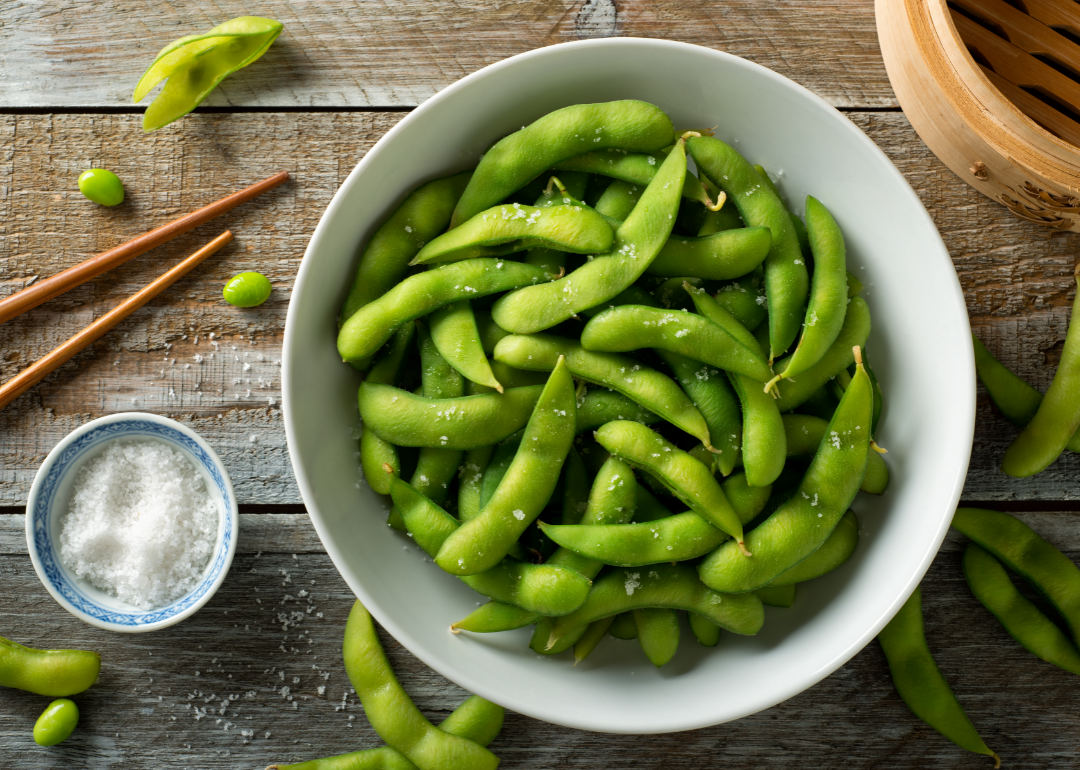
Canva
Edamame
- Protein per 100g: 18.2g
--- Protein per 200 cal: 21.2g
- Amount for equivalent protein to 100g/200 cal chicken breast: 176.4g/384.9 cal
- Amount for equivalent protein to 100g/200 cal pork chop: 170.3g/300.0 cal
- Amount for equivalent protein to 100g/200 cal beef skirt steak: 157.7g/201.9 cal
Made popular in the Western world by Japanese restaurants, edamame has been part of Asian diets for centuries. Young and tender soybeans in their pod are boiled in water with a hint of salt, and voilà, ready to eat! The legume is rich in minerals, folates, and vitamin B nutrients.
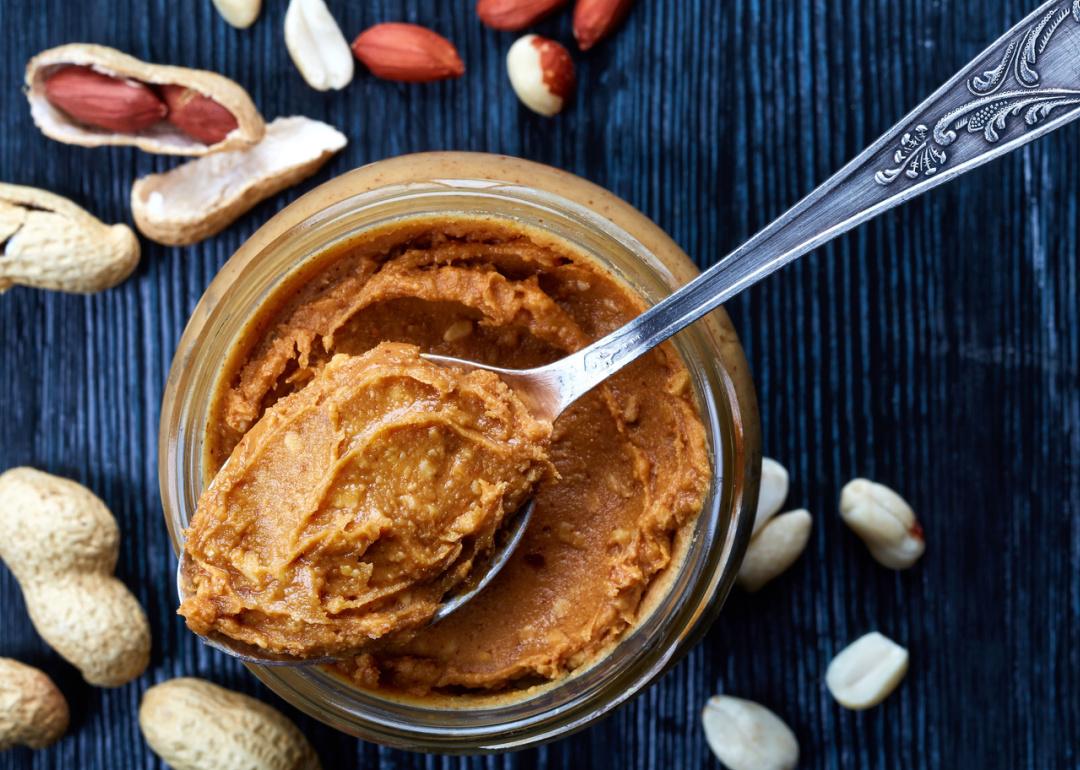
baibaz // Shutterstock
Peanut butter
- Protein per 100g: 24.1g
--- Protein per 200 cal: 8.2g
- Amount for equivalent protein to 100g/200 cal chicken breast: 133.2g/995.1 cal
- Amount for equivalent protein to 100g/200 cal pork chop: 128.6g/775.6 cal
- Amount for equivalent protein to 100g/200 cal beef skirt steak: 119.1g/522.0 cal
Despite their name, peanuts are not nuts; they are legumes. Natural peanut butter (without added sugar, vegetable oil, or other additives) is rich in vitamins E, B3 (niacin), and B6, as well as manganese and magnesium. It is a protein-packed food and a source of healthy fat, which helps reduce LDL cholesterol (the bad kind) and decreases the risk of heart disease.
This story originally appeared on Thistle and was produced and distributed in partnership with Stacker Studio.

